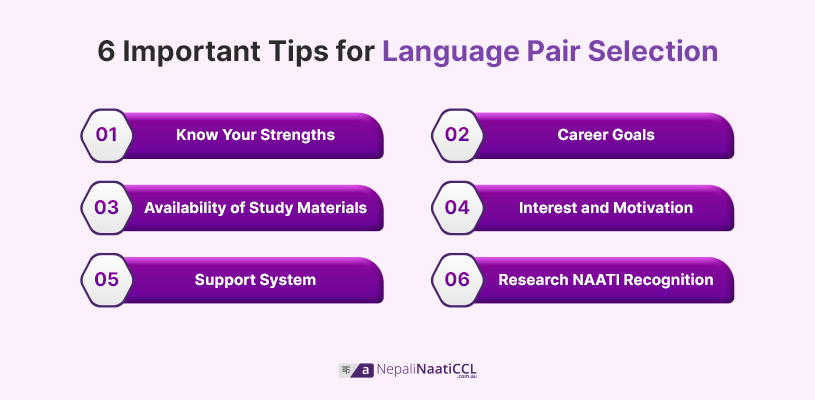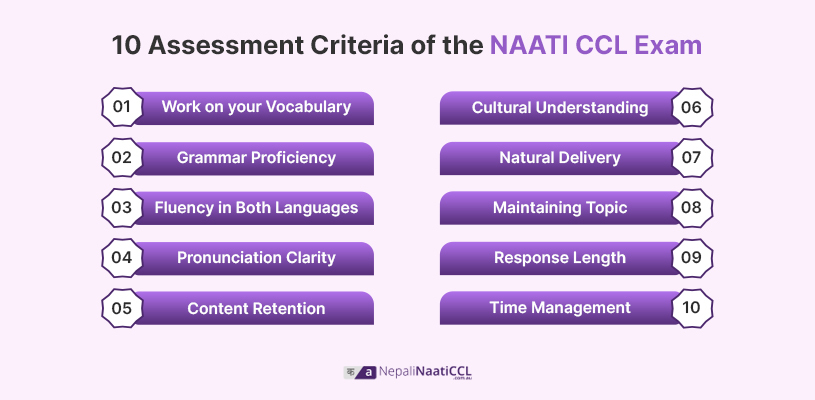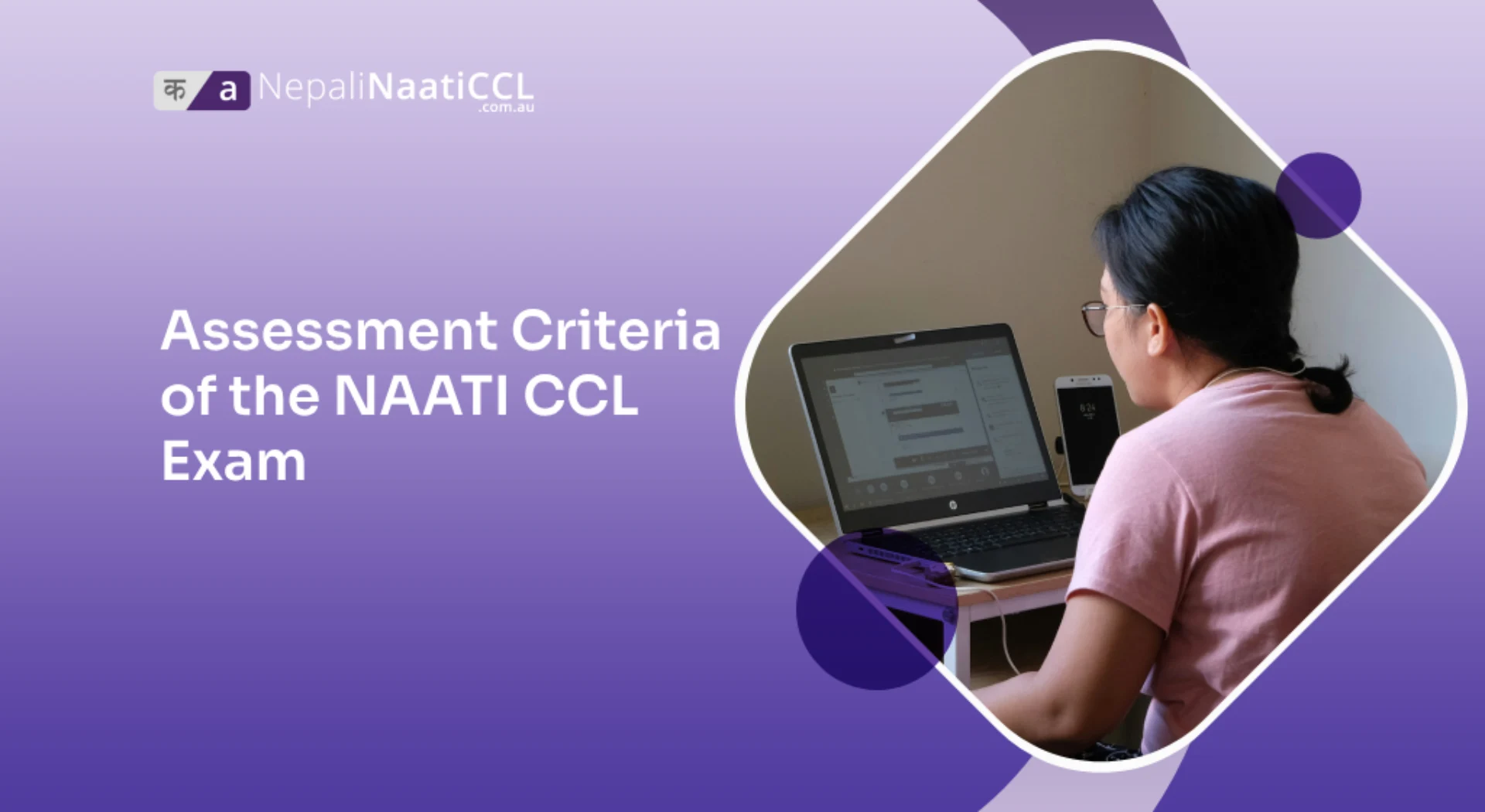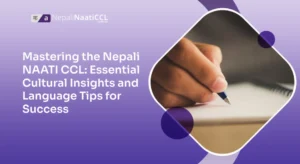Greetings, future Australian PR holders! If you’ve been exploring opportunities in linguistic fields or dreaming of immigrating permanently to Australia, you’ve likely encountered the term “NAATI CCL.” In this blog, we will explore how the NAATI CCL exam is graded, also known as the assessment criteria of the NAATI CCL exam.
The NAATI CCL (Credentialed Community Language) assessment holds the key to a world of linguistic possibilities in Australia. Plus, it offers the golden opportunity to earn five precious Australian Permanent Residency (PR) points, making your migration dreams a reality.
However, to understand the NAATI CCL exam and its assessment, I’ll simplify the process and break it into easy-to-understand pieces. We’ll explore how language pair selection works, what examiners look for when they grade your test, and how you can improve your chances of success.
We’ll cover everything from vocabulary and grammar to speaking fluently and clearly. Let’s get started.
Understanding NAATI CCL Assessment
The NAATI CCL assessment is a significant step for those aiming to work, especially in linguistic fields, or acquire permanent residency in Australia. It’s a test that evaluates your language skills in a specific language pair, and if you do well, you can earn valuable points toward your Australian Permanent Residency (PR) application.
Let’s break it down.
First, you need to choose the right language pair. This means picking two languages, one of which must be English, and the other is a language that NAATI recognizes. This choice is essential, as it determines the language you’ll be tested in.
So, you must think carefully about the languages you’re most comfortable with and consider your career goals.
The actual assessment involves a speaking test. During this test, you’ll have to interpret short dialogues between two speakers, one speaking English and the other in your chosen language.
Likewise, your task is to convey the meaning accurately in the other language. It’s like being a language bridge!
Now, let’s talk about how you’re assessed.
The examiners look at three main things: vocabulary, grammar, and your ability to speak fluently and with clear pronunciation. They want to see if you can understand and convey the conversation smoothly and understandably without missing essential details.
To succeed in the NAATI CCL test, you’ll want to build a strong vocabulary in both languages, improve your grammar skills, practice speaking fluently, and improve your pronunciation. The NAATI CCL assessment can open doors to exciting career opportunities in linguistics and offer five valuable Australian PR points; hence, prepare well and take this opportunity to boost your prospects in Australia.
NAATI CCL Test: 6 Important Tips for Language Pair Selection

Selecting the right language pair for the NAATI CCL exam is a vital first step. To make the best choice, consider languages you’re comfortable with and consider your career goals. One of the languages must be English, and the other should be one that NAATI recognizes.
Hence, I will provide six crucial tips to help you decide right on selecting LOTE (language other than English), make your preparation journey smoother, and ace the NAATI CCL test.
1. Know Your Strengths
When you think of picking the languages for your NAATI CCL exam, starting with what you’re already good at is smart. Consider the languages you feel most comfortable speaking and understanding.
Similarly, think about the languages you use regularly at home, with friends, or at work. These are the languages where you have strength.
Choosing a language pair where you’re strong makes studying and taking the exam much more effortless. You won’t have to struggle as much to understand and speak. So, take some time to reflect on the languages you’re confident with before deciding.
2. Career Goals
Your future career plans play a significant role in picking the right language pair. Some jobs in Australia might require you to be proficient in a specific language.
For instance, if you want to work in a role that involves translating or interpreting, you’ll need to know the language relevant to that job.
Therefore, consider what kind of work you want to do in Australia. If you have a particular job or field in mind, check if they require knowledge of a particular language.
If they do, it’s wise to choose that language as one of your options. This way, you’ll be well-prepared for your future career.
3. Availability of Study Materials
Moving on to another point, adequate preparation is vital to succeed in the NAATI CCL exam. Hence, one crucial aspect of preparation is having access to study materials. These materials can include textbooks, online courses, practice tests, and more.
They are your tools for learning and practicing the language.
Before you finalize your language pair, it’s good practice to check if enough study materials are available for the language combination you’re considering. Having a variety of resources at your disposal will make your preparation smoother and more effective.
4. Interest and Motivation
Learning a new language requires dedication and effort. One way to stay motivated during your language learning journey is to choose a language you’re genuinely interested in.
Moreover, having a passion for a language can make studying and practicing more enjoyable.
Think about the languages that excite you or those you’ve always wanted to learn. If you’re enthusiastic about a language, you’re more likely to stay committed to your studies.
Remember that passion and motivation can be powerful driving forces in your language-learning process.
5. Support System
Having a support system can make a big difference in your language learning journey. This support can come from various sources, such as language courses, language exchange partners, or friends and family who speak the language.
Furthermore, consider if you have access to people who are native speakers of the language you want to learn. Being able to interact with native speakers can significantly improve your language skills.
Enrolling in language courses or finding language exchange partners can provide structure and encouragement in your learning process, which will ultimately help you pass the NAATI CCL test on your first attempt.
6. Research NAATI Recognition
Last but certainly not least, confirming that NAATI recognizes the language you want to choose as your second language for the CCL exam is essential. Not all languages are accepted, so this step is critical to ensure your language pair is eligible for the test.
To check this, you can visit the NAATI website or contact them directly to verify if the language you have in mind is on their list of recognized languages. This step helps prevent any surprises or issues later on and ensures that you can proceed with your chosen language pair confidently.
10 Assessment Criteria of the NAATI CCL Exam

The assessment criteria of the NAATI CCL Exam are like the game rules you need to understand to play and win. These criteria are the guidelines that NAATI examiners follow when grading your performance in the test.
Similarly, these criteria involve crucial aspects like vocabulary, grammar, fluency, and pronunciation. To make your NAATI CCL test successful, you’ll want to pay attention to these criteria and prepare accordingly.
Without further ado, let’s explore what examiners expect from you and the ten assessment criteria of the NAATI CCL exam.
1. Work on your Vocabulary
Being good with vocabulary in the NAATI CCL test means being good with words in both languages. To develop your vocabulary, you need to use a wide variety of words correctly and in the right way for both languages.
Also, having many different words helps you express your ideas better. The examiners want to see if you understand and use words well. So, it’s important to know and use a wide range of words that fit the situation.
Moreover, vocabulary mastery is about having an extensive collection of words for each language and using them correctly during the exam.
2. Grammar Proficiency
Imagine grammar as the rules for building sentences. It helps us structure our thoughts and communicate clearly.
Hence, In the NAATI CCL Exam, using grammar correctly in both languages is incredibly important.
Using grammar accurately allows your message to cross from one language to another without confusion. Following the grammar rules will make your sentence solid and clear.
However, if you make mistakes in grammar, the message you try to convey may not be appropriately understood. Also, using the correct word order, verb forms, and punctuation prevents sentence misunderstandings.
So, in the CCL exam, strive to structure your sentences correctly in both languages to ensure your messages come across clearly and without confusion.
3. Fluency in Both Languages
Think of fluency as speaking a language smoothly. Fluent in a language means you can talk with few stops, pauses, or stumbling over words.
Similarly, In the NAATI CCL Exam, fluency is a vital factor. Speaking fluently shows that you’re able to express yourself in both languages. This is essential because it indicates your comfort with the languages you’re using.
Speaking fluently helps you convey your thoughts smoothly, which is essential for effective communication.
So, during the NAATI CCL Exam, aim to speak relaxed and naturally, just like you’re talking to a friend. It’s about being at ease with the languages and expressing yourself without feeling stuck or unsure.
Moreover, practicing fluency helps your messages flow smoothly from one language to another, making your communication clear and comfortable.
4. Pronunciation Clarity
Clear pronunciation means saying words in a way people can easily understand, like a musician playing a song without missing a beat.
In the NAATI CCL Exam, pronunciation clarity is vital because it ensures your words are understandable. When you pronounce words accurately, you will give a good impression on your examiner or any other individual.
So, when preparing for the NAATI CCL Exam, focus on pronouncing words accurately. Moreover, clear pronunciation conveys your message without distortion or misunderstanding, making communication effective for the listener.
5. Content Retention
Content retention is an aspect that assesses your ability to understand and remember the content of the conversation during the NAATI CCL Exam.
During the NAATI CCL exam, you’ll listen to a conversation and then accurately convey its meaning in another language.
Furthermore, content retention also means having a good memory. Just as remembering important information helps you make wise decisions, you need to remember the conversation’s details in the exam to answer correctly.
Likewise, you can also consider content retention as the foundation of effective communication.
In a professional setting, content retention is similar to taking meeting notes. You can refer to them for clarity and accuracy when you jot down important points.
To excel in content retention, practice active listening. Also, you need to absorb the information thoroughly so that you can recall it when needed.
6. Cultural Understanding
Cultural understanding is a critical component of the NAATI CCL Exam. It involves more than just knowing the words and grammar of a language; it’s about comprehending the customs, beliefs, and traditions that shape how people communicate.
Additionally, cultural understanding is crucial to unlocking effective communication. Just as understanding the context of a conversation is crucial for meaningful dialogue, recognizing the cultural nuances is essential for accurate interpretation in the NAATI CCL test.
Similarly, it enables you to interpret the words and cultural context, ensuring that your responses are culturally sensitive and accurate. This skill is vital for effective communication and building positive relationships in multicultural environments.
7. Natural Delivery
Natural delivery is about speaking genuinely and comfortably as if you’re having a regular conversation with someone. However, in the NAATI CCL Exam context, natural delivery means avoiding sounding rehearsed or robotic. I
Also, this skill is crucial because it demonstrates your true language abilities and makes your communication more relatable. When you speak naturally, it’s easier for listeners to connect with you and understand your message.
Natural delivery involves conversational tone and pace, like when talking to a friend or colleague. It’s about avoiding overly complex language or expressions that might make your speech sound artificial. Instead, it’s like using everyday language that people can easily relate to.
Hence, if you want to clear the NAATI CCL test, you must develop this skill and try to avoid common mistakes, as it is essential for building connections with your audience and making your communication more effective in various settings.
8. Maintaining Topic
The criteria of maintaining a topic evaluate your ability to stay on the subject or theme of the conversation without going off track or discussing unrelated matters.
Also, In the context of the NAATI CCL Exam, maintaining the topic is vital because it ensures that your responses are directly related to the content of the conversation. This skill is essential for effective interpretation and communication.
Moreover, if you dont get distracted from the topic, your responses align with the context of the discussion.
In a professional setting, staying on topic in a conversation showcases your true interpretation proficiency. It helps keep conversations organized, ensures clarity, and prevents misunderstandings.
9. Response Length
Response length refers to the amount of information you provide in your answers during the NAATI CCL Exam. It’s about finding the right balance – not speaking too briefly, but also not overloading your responses with unnecessary details.
In the exam context, response length matters because it reflects your ability to effectively convey the conversation’s meaning. This skill is vital for maintaining a balance between brevity and completeness.
When you tell a story, you include the key details that make it enjoyable and understandable. In the same way, in the exam, your responses should be like well-crafted narratives that capture the essence of the conversation without unnecessary embellishments.
Similarly, response length is essential for effective communication in a professional setting. It ensures you provide the necessary information without overwhelming or under-informing your audience.
10. Time Management
Time management is the skill of efficiently using the allocated time during the NAATI CCL Exam. It involves completing each conversation task within the specified time frame without rushing or running out of time.
Furthermore, time management in the NAATI CCL test is crucial because it ensures that you have adequate time to provide accurate responses for each conversation. It is about pacing yourself appropriately.
In the exam, you must allocate enough time to listen, interpret, and respond to each conversation without feeling rushed. Time management is a valuable tool to maintain composure and focus during the exam.
Likewise, It reflects your ability to handle responsibilities effectively and utilize time wisely. Also, maintain a steady pace to provide accurate responses without feeling rushed. This skill is vital for keeping your performance organized, focused, and successful in exams and professional settings.
NAATI CCL Test Structure
The NAATI CCL test assesses an individual’s ability to interpret and convey spoken content between two languages accurately. This test is a valuable credential for individuals aspiring to work as interpreters in community settings.
Hence, understanding its structure is essential for effective preparation.
Test Format and Languages Offered
The NAATI CCL Test consists of two dialogues, each approximately 300 words in length, conducted in a face-to-face or remote setting. These dialogues are typically based on everyday situations encountered in community and professional settings, such as medical appointments, social interactions, or workplace scenarios.
Furthermore, NAATI offers the CCL Test in various language pairs, including languages spoken within culturally diverse communities in Australia. Candidates can choose from a list of approved language pairs, and it’s essential to select a pair for which they are proficient in both languages.
Dialogue Topics and Test Duration
The dialogues in the test cover a range of topics, often related to community services and interactions. These topics can include healthcare, education, employment, and legal matters.
However, candidates must be familiar with both languages’ vocabulary and terminology relevant to these areas.
Similarly, the NAATI CCL Test typically spans around 60 minutes, including 15 minutes of orientation and practice dialogues. Each test dialogue lasts approximately 20-25 minutes, during which candidates listen to the dialogue and then interpret it in another language.
However, the remaining time is allocated for preparation and breaks.
Assessment Criteria and Scoring
Candidates are assessed based on criteria that cover language proficiency, interpretation skills, and cultural competence. Also, key criteria include vocabulary mastery, grammar proficiency, fluency, pronunciation clarity, content retention, cultural understanding, natural delivery, maintaining topic, response length, and time management.
Moreover, the test is marked by trained NAATI assessors who evaluate candidates’ performance against the assessment criteria. To pass the test, candidates must meet the minimum passing score of 29 in each section.
Adequate Preparation and Result
Adequate preparation is crucial for success in the NAATI CCL Test. This involves honing language skills in both languages of the chosen pair, practicing interpretation techniques, and familiarizing with common vocabulary and situations in community and professional contexts.
Also, you can typically receive your test results within four to ten weeks of taking the exam. If successful, they receive a NAATI CCL qualification, which can be a valuable asset for pursuing career opportunities and earning five valuable Australian PR points.
Conclusion
In conclusion, understanding the assessment criteria of the NAATI CCL test is fundamental if you want to succeed. The criteria in this blog cover a wide range of topics and can be super helpful for your preparation journey.
Similarly, you can never avoid consistent practice and preparation involving language skill refinement, interpretation practice, and familiarity with relevant vocabulary and contexts because it will bring you success indefinitely.
Additionally, for those seeking assistance and resources for the NAATI CCL Exam, NepaliNAATICCL is an invaluable online portal. It is a comprehensive platform for all NAATI CCL Online Test queries.
NepaliNAATICCL provides a wealth of resources, including NAATI CCL course materials, NAATI CCL mock tests, and free NAATI CCL test samples. These resources help candidates excel in the exam and attain the coveted NAATI CCL qualification.
Having provided all this information, I wish you all the best for your future endeavors. I hope you achieve what you wish from the NAATI CCL test.
Happy Learning!!
FAQ
Q.1: How many dialogues are there in the NAATI CCL Test?
The test consists of two dialogues, each approximately 300 words long, designed to simulate real-life community interactions.
Q.2: What languages can I choose for the NAATI CCL Test?
NAATI offers the CCL Test in various language pairs, including languages spoken in diverse Australian communities. You should choose a pair for which you are proficient in both languages.
Q.3: How long is the NAATI CCL Test?
The test typically takes around 60 minutes, including orientation and practice dialogues, with each dialogue lasting approximately 20-25 minutes.
Q.4: What are the assessment criteria for the NAATI CCL Exam?
The assessment criteria include vocabulary mastery, grammar proficiency, fluency, pronunciation clarity, content retention, cultural understanding, natural delivery, topic maintenance, response length, and time management.
Q.5: Where can I find NAATI CCL preparation materials and mock tests?
Answer: You can access NAATI CCL course materials, mock tests, and free test samples on portals like NepaliNAATICCL and CCLHUB, which offers a wealth of resources to aid your exam preparation.




